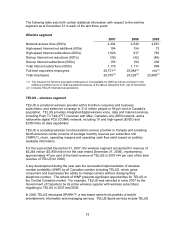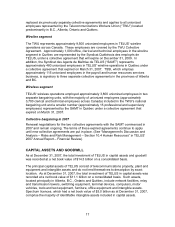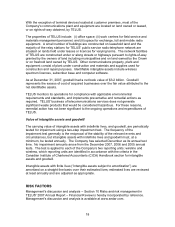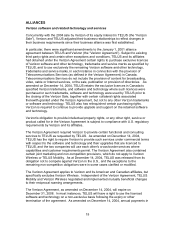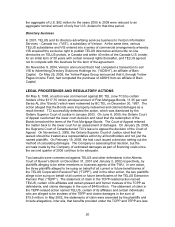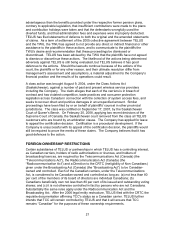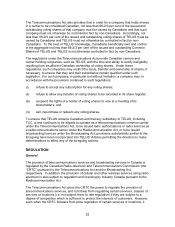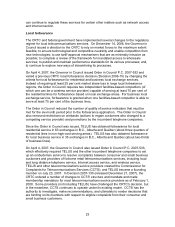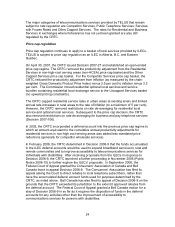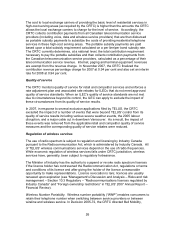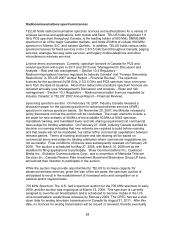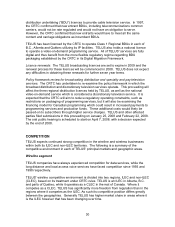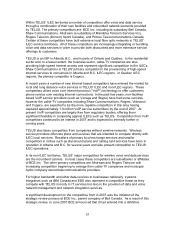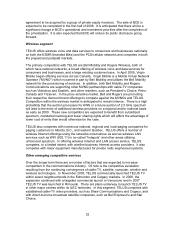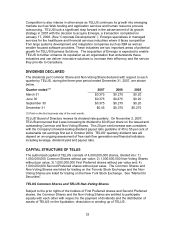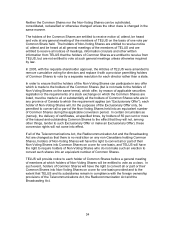Telus 2007 Annual Report Download - page 25
Download and view the complete annual report
Please find page 25 of the 2007 Telus annual report below. You can navigate through the pages in the report by either clicking on the pages listed below, or by using the keyword search tool below to find specific information within the annual report. 25
On July 6, 2007, the CRTC issued Decision 2007-50 which partially approved TELUS’
broadband expansion proposal for 115 locations in B.C. and Québec.
On January 17, 2008, the CRTC released Decision 2008-1 which identified an additional
119 rural and remote communities in TELUS’ incumbent operating territory that are
eligible for broadband expansion using deferral account funds. In addition, the decision
approves the use of approximately 5 per cent of the accumulated balance of TELUS’
deferral account for improving access to telecommunications services for persons with
disabilities. The CRTC also determined that any funds remaining in TELUS’ deferral
account, other than those required to implement the broadband expansion and
accessibility initiative, should be rebated to the Company’s residential local customers in
non-high cost serving areas. On February 11, 2008, Bell Canada applied to the Federal
Court of Appeal for leave to appeal, and for a stay of, Decision 2008-1. The stay, if
granted, would apply to the rebate and broadband expansion determinations in Decision
2008-1. TELUS would still be obligated to implement the accessibility initiatives.
On March 8, 2008, the Federal Court of Appeal rejected the Consumers’ Association
and Bell Canada appeals of Decision 2006-9. Decision 2006-9 continues to be subject
to the stay imposed by the Federal Court of Appeal until the 60 day period to appeal the
Federal Court of Appeal decision expires or until the Supreme Court of Canada
determines whether or not to hear any appeal filed in respect of the Federal Court of
Appeal decision. There is no guarantee that the ILECs will be able to proceed with their
proposals for the use of deferral account funds pending the outcome of such appeals.
Local competition framework
The regulatory framework for local services competition has a number of components,
the more important of which are summarized below.
Essential Services
The CRTC requires ILECs like TELUS to make certain “essential facilities” available to
competitors, at rates based on the ILEC’s incremental cost plus an approved mark-up.
In December 2007, the CRTC completed an extensive review of the regulatory
framework for essential services initiated by Public Notice 2006-14.
On March 3, 2008, the CRTC issued Decision 2008-17 which set out a three to five year
phase-out process after which time various non-essential services will no longer be
subject to regulation. Services subject to phase out include fibre-based access and
transport services, higher speed competitor digital network (“CDN”) access, all speeds of
other CDN services, Ethernet services, and operator services. During the phase-out
period, ILECs are permitted to negotiate “off-tariff”, competitor-specific supply
arrangements, for services subject to phase out, without Commission approval. For all
other mandated wholesale services (including unbundled local loops, low-speed CDN
access facilities, asymmetric digital subscriber line (“ADSL”) access service and co-
location services), there is no change to the pricing principles. As well, these facilities
remain subject to mandated supply until market conditions change. Any party can apply
in the future to remove the mandated supply obligations for these facilities based on
changes in market conditions.
Contribution and portable subsidies


